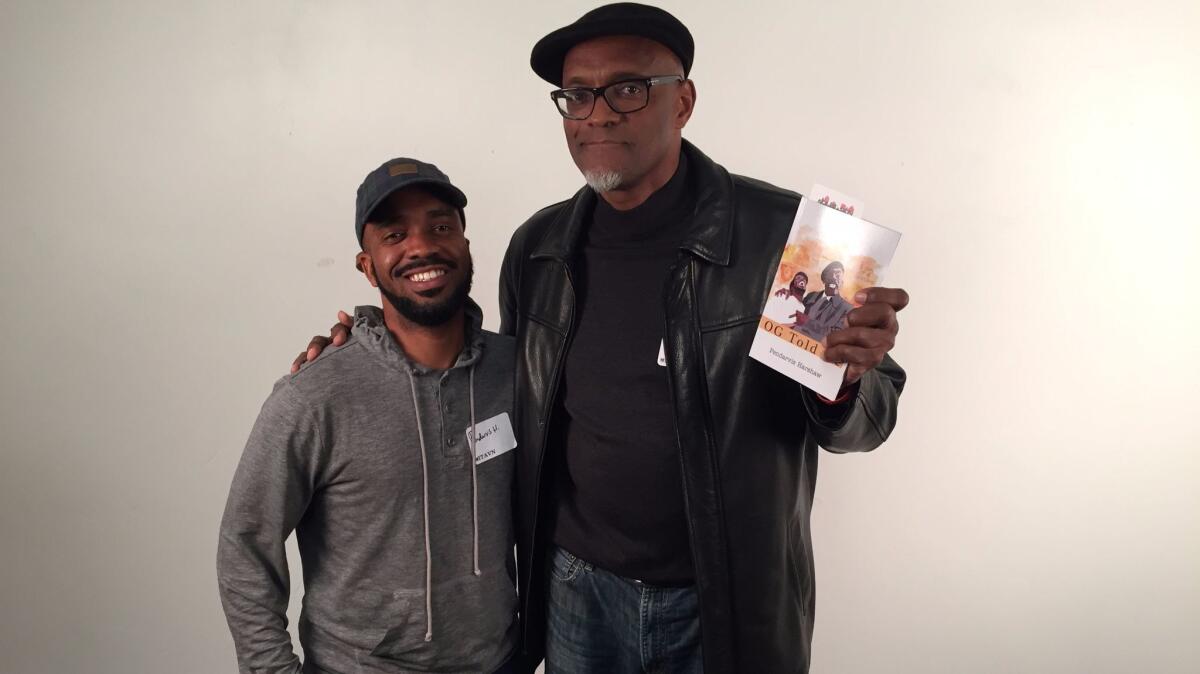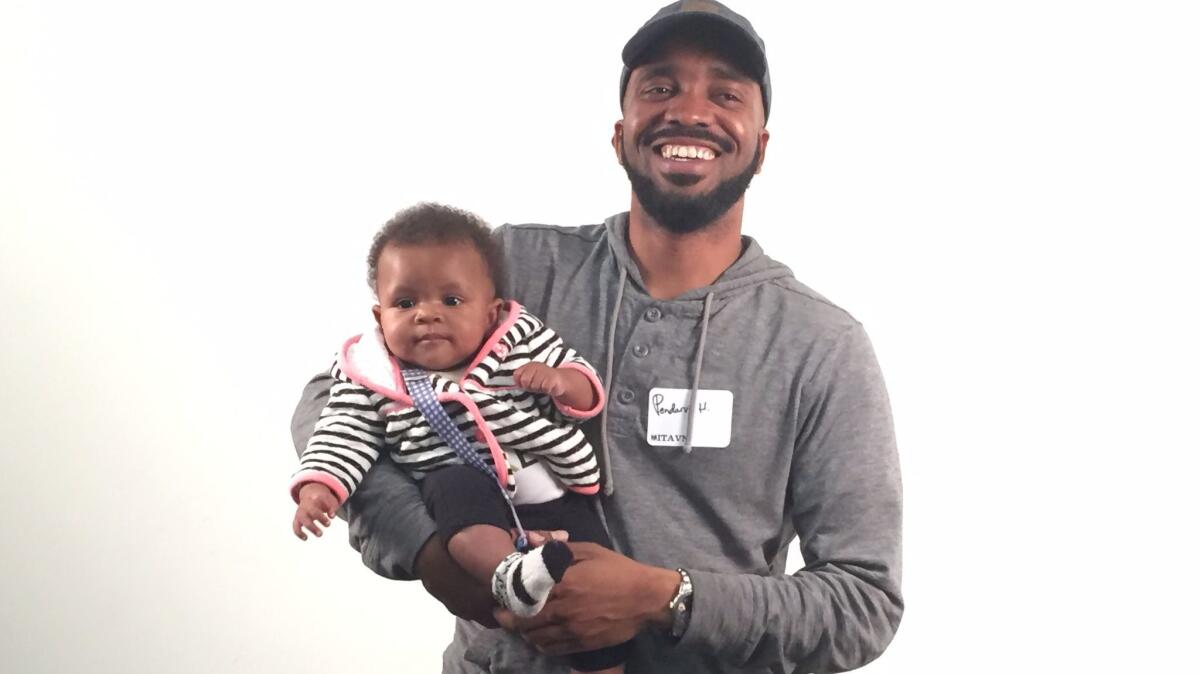California Journal: A young man in Oakland has captured the wisdom of his elders on a blog and in a book

I am not sure how I first learned about Pendarvis Harshaw, but I was taken by the idea that this young man from Oakland had spent years asking older black men — many of them strangers he encountered as he biked — whether they had any wisdom to impart to kids like him.
Their answers, and photographs, appear on Harshaw’s blog, OG Told Me. “OG” is a term of respect that has transcended its literal meaning, “original gangster.” Nowadays, as one of Harshaw’s interview subjects points out, it really just means “old guard.”
Harshaw’s OGs are mostly regular guys. Some are athletes, street preachers or former Black Panthers. Others are educators, activists or drunks. Some give only a first name, others only a last. Some give pseudonyms.
Harshaw, a product of UC Berkeley’s Graduate School of Journalism by way of Howard University, chats them up about their lives, and his last question never varies: “Given your life experience, if you had a chance to talk to young people, what advice would you give them?”
Some of the men seem surprised, others like they’ve been waiting forever to be asked. Their responses are sometimes trite, occasionally impenetrable or vulgar, and often profound.
“Follow your heart. Stay close to your mother,” said a man who called himself “David Ruffin,” because he looks like the Temptations’ late lead singer.
“You can’t help those who don’t help themselves,” said one identified only as Mr. Phifer.
“If I kill another black man, I commit suicide, not homicide. We are one,” said retired San Francisco State psychology professor Wade Nobles.
“How does the chick get out of the egg?” asked Arnold Perkins, former director of the Alameda County Health Department. “Persistent pecking.”
“The greatest lesson you can ever learn, is how much you don’t know,” said Achebe Hoskins, an executive with Oakland’s Youth Mentoring Center.
“Elders don’t understand young people because they are fearful of them, and young people don’t value their elders, so they don’t appreciate them,” Harshaw, 29, told me. “I’ve tried to be a bridge.”
::
Harshaw, who grew up without a father, has been doing this work since high school.
“It was my life. I would walk down the street and some older guy — a drunk or a street preacher — would say some tidbit of wisdom that I would incorporate into my raps and poetry. Since I was a photojournalist, I decided to put it into that form.”
Recently, he self-published a book named after his blog. “It’s my coming-of-age story,” Harshaw said. “Essays about me growing up in Oakland, going out with good friends, doing something dumb, then some older man, be it a bus driver or a security guard, giving us some wisdom.”
Where can I get a copy, I asked.
“It’s only available out of my backpack so far,” he said with a laugh. He’s sold or given away 400 copies.
::
Harshaw works on strategic communications for PolicyLink, an Oakland research and advocacy company where he focuses on California policy issues involving boys of color.
Last week, he was in Sacramento in connection with a bill before the Legislature that would allow victims of violence to benefit from the state’s victim compensation fund even if their names appear in a gang database. He is also working on an effort to extend a ban on suspending California schoolchildren for “willful defiance,” which has had a disproportionate effect on African American children.
His life is very much in sync with his work, a quality I admire. He told me he belongs to a network called Brotherhood of Elders, a multigenerational support group for black men.
“We meet the first Saturday of every month and discuss a little of everything: love and relationships, the housing situation in Oakland. Healthy eating is a big one.”
At Brotherhood of Elders, he met a young civil rights attorney, Chris Bridges, who has developed a new social media platform called It Takes a Village Nation. The website is designed as a resource for people of color and organizations and businesses that serve them. “We’re trying to re-instill that adage that it takes a village to raise a kid, support each other and build businesses,” Bridges said.
On Thursday, Harshaw invited me to the platform’s launch party at Oakland’s Greenlining Institute, a nonprofit organization dedicated to racial and economic justice. As a crowd of social activists and entrepreneurs sipped drinks and learned how to use the website, Harshaw sat behind a long table selling books, holding his 6-month-old daughter, Zuri, on his lap.

Bridges, 32, told me he finds Harshaw’s work inspiring.
“What’s missing between generations is the ability to connect the dots,” he said. “This country was founded on the idea of keeping African Americans out of power, keeping them as property and making sure they didn’t have guns or any formal protection to survive a very racist and oppressive system. It’s imperative to keep having these conversations.”
Harshaw introduced me to Greg Hodge, 57, a former Oakland Unified School District board member who described himself as “a youth development activist, minister, drummer and dad.” He has also been featured on the OG Told Me blog.
“Pendarvis is a storyteller,” Hodge said. “His interest in telling the untold story is important, particularly for African American men, because the narrative that’s often told about us is one of criminality, of being deadbeat dads, of being misogynists. He breaks that mold.”
Harshaw’s work, Hodge said, reminds him of the traveling poets, singers and storytellers of West African known as griots, who keep history alive and circulate news. “I honor Pen as a young griot who makes sure that people keep memories alive for future generations.”
If I kill another black man, I commit suicide, not homicide. We are one.
— Retired San Francisco State psychology professor Wade Nobles
Twitter: @AbcarianLAT
ALSO
Decades before Black Lives Matter, there were the Black Panthers in Oakland
UC Berkeley’s tiny minority of black students finally get a space to call their own



